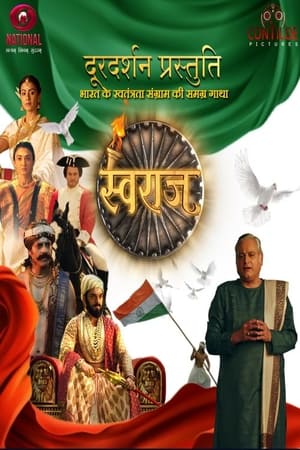

Swaraj
Swaraj is a docu-drama series that celebrates 75 years of Indian independence. It features the lives and sacrifices of lesser-known heroes of the freedom struggle. The show bring to life the stories of unsung heroes who sacrificed and fought for India over 450 years of freedom struggle but remain unheard and unknown to this day despite their untold sacrifices.
Documentary
Episodes (10)
Episode 1
Episode starts with a historical setting in 1498 introducing India's rich cultural heritage and diverse kingdoms. Vasco da Gama's arrival in India marks a pivotal moment. The episode depicts the Zamorin (Samoothiri) of Calicut a major figure and his realm's prosperity. The story unfolds with cultural misunderstandings, trade attempts and complex interactions between Portuguese and Indian kingdoms.
Episode 2
Episode revolves around the Vijayanagara Empire's history, highlighting its establishment and prosperity. It begins with Malik Kafur's southern invasion under the Delhi Sultanate, leading to the downfall of the Pandyan Dynasty. The episode also covers the reign of Krishnadevaraya, the empire's zenith, cultural and architectural achievements, and interactions with the Portuguese.
Episode 3
Episode is about Rani Abbakka, the fearless queen of Ullal, who fiercely opposes Portuguese colonial forces. Despite facing betrayal from her husband, Raja Veera Narasimha, who aligns with the Portuguese for his gains, Rani Abbakka remains resolute in her mission to protect her kingdom. The episode depicts her strategic and brave resistance against the colonial powers.
Episode 4
This episode delves into the life of Shivappa Nayaka, a significant figure in the Nayaka kingdom. The episode highlights his military accomplishments, strategic prowess, and his role in resisting Portuguese colonialism. It portrays his challenges in governance, political dynamics, and his personal journey through these complex times.
Episode 5
This episode focuses on the life and achievements of Shivaji Maharaj, a legendary Maratha warrior and founder of the Maratha Empire. The episode covers his early life including the influence of his mother Jijabai. It highlights his military strategies, guerrilla warfare tactics and the establishment of the Maratha Empire. The episode concludes with his coronation as Chhatrapati.
Episode 6
Kanhoji Angre from 1667 to 1729 was the first notable chief of the Maratha Navy and popularly known as Samudratla Shivaji. He occupies a unique position in the history of Bharat and in the annals of Arabian sea history. For four decades, he led his sailors from victory to victory and raised the naval prestige of Maharashtra to an unprecedented height.
Episode 7
Baji Rao, commonly known as Bajirao Ballal was the seventh Peshwa of the Maratha Empire. He was born on 18 August 1700. During his twenty year reign as Peshwa, he conquered the Mughals and their vassal Nizam-ul-Mulk in the Battle of Delhi and the Battle of Bhopal. His accomplishments include the establishment of Maratha domination in southern India as well as a political power in northern India.
Episode 8
Chimaji Appa was the younger brother of Peshwa Baji Rao. The episode highlights Chimaji Appa's military campaigns against the Portuguese in Vasai, emphasizing his strategic brilliance and valor. It depicts his successful efforts to liberate the western coast of India from Portuguese rule, showcasing key battles and the challenges faced during these confrontations.
Episode 9
The episode covers the establishment and challenges faced by the French East India Company in India. It details the efforts of the French to expand their influence in India, competing with other European powers like the British and Dutch. The narrative showcases the strategies employed by key French figures to establish trading posts and the conflicts they encounter.
Episode 10
Episode focuses on Dutch and the English East India Company. It explores their efforts to establish dominance in India during the 16th century initially driven by trade ambitions. The episode depicts various historical interactions and conflicts particularly between East India Company, Dutch and local Indian powers. Key events include Dutch's attempts to trade and establish factories in India.






